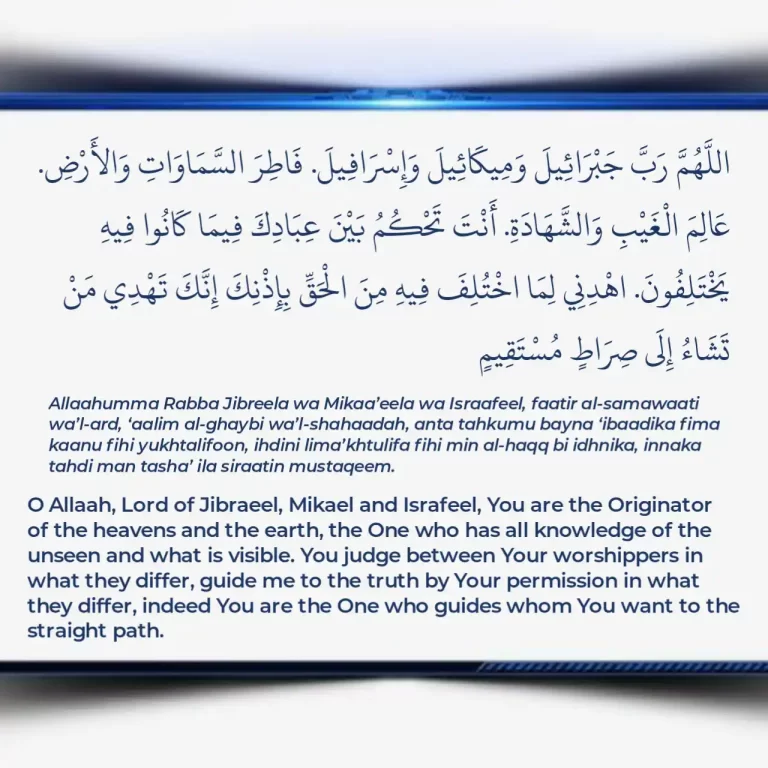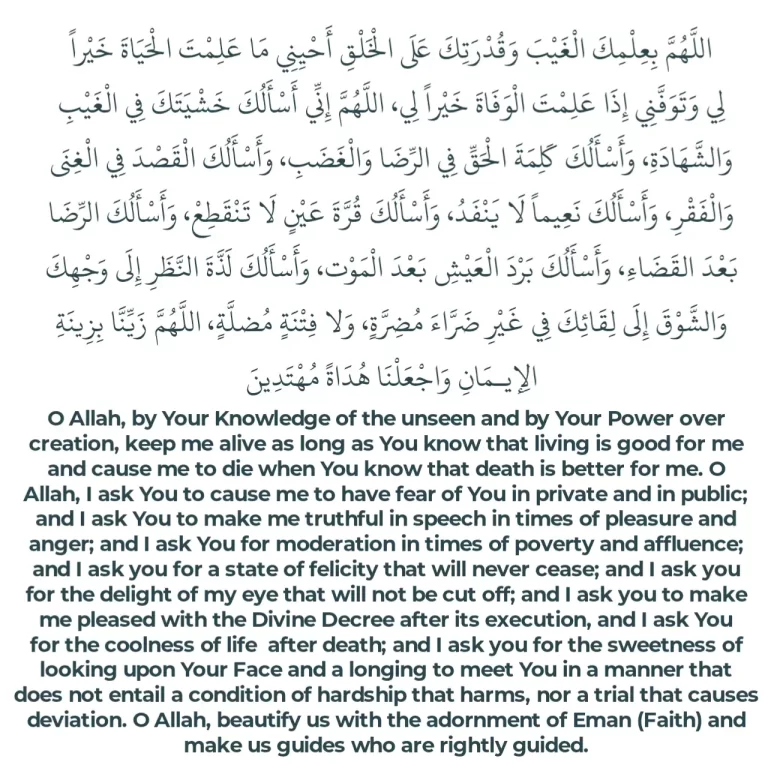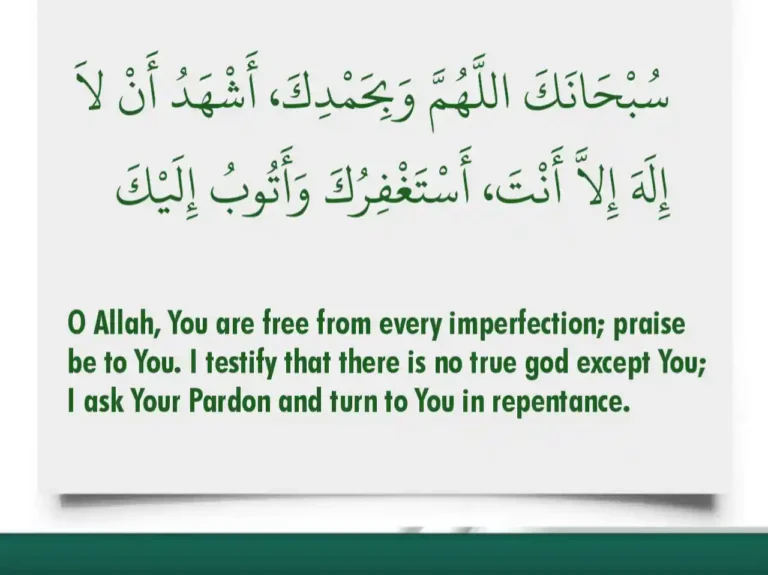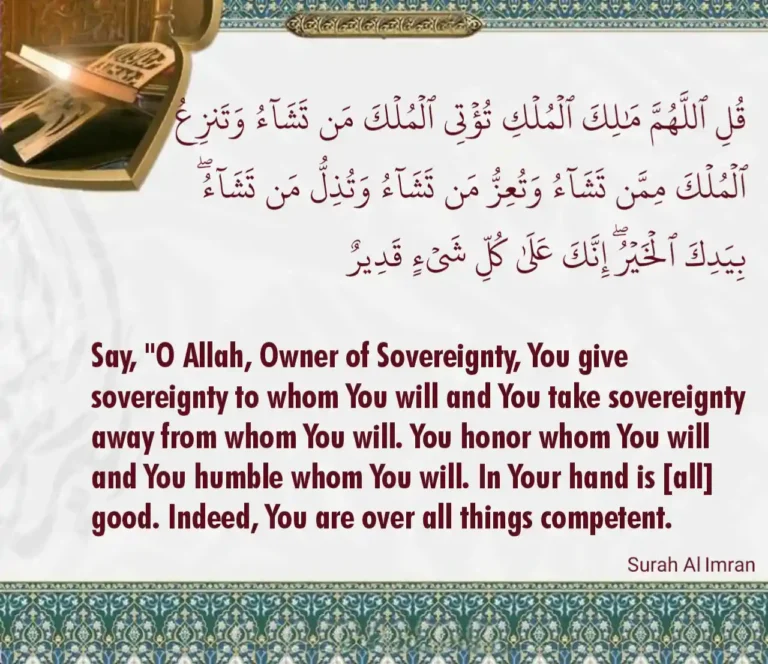Allahumma Hasibni Hisaban Yasira Meaning, Arabic Text, and Benefits
Allahumma Hasibni Hisaban, a powerful invocation, is a heartfelt plea to Allah, seeking an easy reckoning on the Day of Judgment. In this blog, we will delve into the profound meaning of this Dua and its benefits.
Advertisements
Allahumma Hasibni Hisaban Yasira Meaning in English
Allahumma hasibni hisaban yasira means O Allah grant me an easy reckoning.
Allahumma Hasibni in Arabic
Here is the Arabic text of the Dua:
اللهُمَّ حَاسِبْنِي حِسَابًا يَسِيرًا
Transliteration
The Dua is transliterated as Allaahumma hasibni hisaban yaseeran.
Advertisements

Hadith Reference
Aisha reported: I heard the Prophet, peace and blessings be upon him, say in some of his prayers, “O Allah, bring me to account with an easy reckoning.”
Source: Musnad Aḥmad 24215 Grade: Sahih (authentic) according to Ibn Kathir
As we all know, reckoning will happen on the day of resurrection, that is, we will be questioned about all that we did in this world.
This is a heartfelt request to Allah for a smooth and merciful judgment on the Day of Reckoning.
RELATED POSTS:
Types of Reckoning
The reckoning on the Day of Resurrection will be of two types:
1. The presentation of deeds
This will be only for the believer. He will be questioned about his deeds, his knowledge and the blessings that Allah bestowed upon him.
Advertisements
He will respond in a way that will put him at ease and explain his point in a convincing manner and in a way that will cause the blessings of Allah to continue to be bestowed upon him.
And when his sins are shown to him, he will admit them, then Allah will conceal them for him and will pardon him for them.
This will not be a thorough examination and he will not be interrogated. Then he will take his book (record of deeds) in his right hand, and he will turn to his family in Paradise happily, because he has been saved from the punishment and has attained reward.
Advertisements
Al-Bukhaari (6536) and Muslim (2876) narrated from ‘Aa’ishah that the Prophet (blessings and peace of Allah be upon him) said:
“Whoever is examined thoroughly at the Reckoning will be punished.” I said: Didn’t Allah, may He be exalted, say: “He surely, will receive an easy reckoning” [al-Inshiqaaq 84:8] He said: “That is the presentation of deeds.”
Al-Haafiz (may Allah have mercy on him) said: al-Qurtubi said: What is meant by “That is the presentation of deeds” is that the reckoning mentioned in the verse refers only to the presentation of the believer’s deeds to him so that he will acknowledge Allah’s favour to him by concealing them in this world and by pardoning him for them in the Hereafter.
Ahmad (24988) narrated that ‘Aa’ishah said: I asked the Messenger of Allah (blessings and peace of Allah be upon him) about the easy reckoning. I said: O Messenger of Allah, what is the easy reckoning? He said: “A man’s sins will be shown to him, then he will be pardoned for them; whoever is examined thoroughly at the reckoning is doomed.”
Classed as saheeh by al-Albaani in Zilaal al-Jannah (2/128)
Shaykh Ibn ‘Uthaymeen (may Allah have mercy on him) said:
The believer will be brought to account but it will not be a reckoning in the sense of a thorough examination, because the Prophet (blessings and peace of Allah be upon him) said:
“Whoever is examined thoroughly at the reckoning is doomed – or will be punished.” Rather his reckoning will be the presentation of deeds.
End quote from al-Liqa’ ash-Shahri (1/378)
Al-Bukhaari (2441) and Muslim (2768) narrated that Ibn ‘Umar (may Allah be pleased with him) said:
I heard the Messenger of Allah (blessings and peace of Allah be upon him) say: “Allah will draw the believer close and screen him and will say,
‘Do you admit such and such sin, do you admit such and such sin?’ and he will say, ‘Yes, O Lord.’ Then when he has admitted his sins and thinks that he is doomed, [Allah] will say, ‘I concealed them for you in the world and I forgive you for them this Day.’
Then he will be given the book of his good deeds. But as for the kaafir and the hypocrite, ‘the witnesses will say,
“These are the ones who lied against their Lord!” No doubt! the Curse of Allah is on the Zaalimoon (polytheists, wrongdoers, oppressors)’ [Hood 11:18 – interpretation of the meaning].”

2. The reckoning in which they will be thoroughly examined.
This is the reckoning of Allah for the disbelievers and whomever He will of the sinners among those who affirmed His Oneness.
Their reckoning may be a lengthy and difficult, according to the quantity of their sins.
With regard to these sinners among those who affirmed His Oneness, Allah may admit whomever He will of them to Hell for some time, then He will bring them forth and admit them to Paradise for ever.
Muslim (2968) narrated that Abu Hurayrah said: They said: O Messenger of Allah, will we see our Lord on the Day of Resurrection?
He said: “Do you have any problem in seeing the sun at noon when there are no clouds?” They said: No. He said: “Do you have any problem in seeing the moon on the night when it is full, when there are no clouds?” They said: No.
He said: “By the One in Whose hand is my soul, you will not have any greater problem in seeing your Lord than you do in seeing either of them. Allah will meet His slave and will say: O So and so, did I not honour you, make you a chief, give you a spouse and subjugate horses and camels to you, and give you the opportunity to be a leader?
He will say: Yes. He will say: Did you think that you would meet Me? He will say: No. He will say: Then I will forget you as you forgot Me.
Then He will meet a second person and will say: O So and so, did I not honour you, make you a chief, give you a spouse and subjugate horses and camels to you, and give you the opportunity to be a leader?
He will say: Yes, O Lord. He will say: Did you think that you would meet Me? He will say: No. He will say: Then I will forget you as you forgot Me.
Then He will meet a third person and will say something similar to him, and he will say: O Lord, I believed in You and in Your Book and Your Messengers, and I prayed and fasted and gave charity, and he will mention as many good things as he can.
He will say: Stop here. Then it will be said to him: Now We will send Our witnesses against you, and he will think to himself: Who can bear witness against me?
Then a seal will be placed on his mouth and it will be said to his thigh, his flesh and his bones: Speak. His thigh and his flesh and his bones will speak of his deeds, so as to establish proof from himself. That is the hypocrite, that is the one with whom Allah will be angry.”

Shaykh Ibn ‘Uthaymeen (may Allah have mercy on him) said:
The scholars (may Allah have mercy on them) differed concerning the words “Then, on that Day, you shall be asked about the delight (you indulged in, in this world)” [at-Takaathur 102:8]: does this refer to the disbeliever or to both the believer and the disbeliever?
The correct view is that it refers to both the believer and the disbeliever. Each of them will be questioned about the delights and blessings they indulged in, but the disbeliever will be asked by way of rebuke, whereas the believer will be asked by way of reminding.
The questioning of the believer will be by way of reminding him of the blessings that Allah, may He be glorified and exalted, bestowed upon him, so that he will rejoice and will realise that the One Who blessed him in this world will honour them with His blessing in the Hereafter. As for the disbeliever, it will be a questioning by way of rebuke.
End quote from Liqa’ al-Baab al-Maftooh (98/9)
Taken from Islamqa site.
And Allah knows best.
Advertisements








2 Comments
Comments are closed.